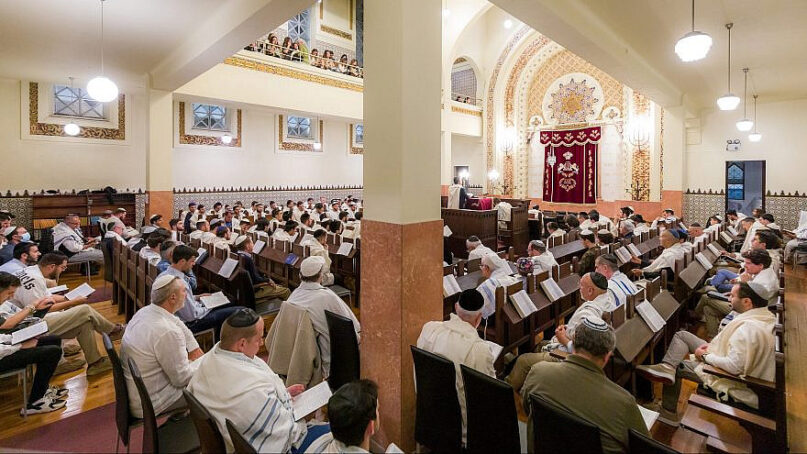
Oporto Jewish community attempts to turn tables on accusers by declaring case over
By David Isaac
(JNS) The Jews of Oporto, Portugal, declared that an antisemitic campaign targeting their community has reached its ignominious end. The announcement came as the community released a commemorative book celebrating the centenary of its modern founding, which includes a section detailing the story of the recent attacks against it.
“The state did not declare that the case is closed. We are the ones who declare this and reverse the game,” Gabriel Senderowicz, president of the Jewish Community of Oporto, told JNS, explaining that the goal is to spur legal action and bring those responsible to account.
Normally, the state would carry on the investigation for 10 years, declaring it over after everyone has conveniently forgotten about it, Senderowicz said.
“The community will not wait a decade until all is forgotten. All of this was an antisemitic fabrication and we demand an international investigation. If the European Union does not carry out this investigation, we will ask the strongest states in the world for help.”
The campaign against the community centered on the Nationality Law for Portuguese Sephardic Jews, or “Sephardic Law”—2015 legislation extending Portuguese citizenship to descendants of Jews expelled from the country in the 15th century. It was conducted by public figures and members of the press. The community asserts that state actors were behind it, pulling the strings.
“They were a group of antisemitic politicians, journalists and influencers,” Senderowicz said. “They launched a slanderous campaign against the law, saying ‘candidates only want passports of convenience.’ ”
The “campaign of defamation” accused those wanting Portuguese citizenship of paying lawyers and genealogists to sign off that they met the criteria, scaring the public with the claim that “tens of millions of candidates” were waiting for passports and giving the false impression that Portugal would be inundated by an influx of Jews. The community was accused of running a racket by rubber-stamping citizenship certificates, Senderowicz said. “It was presented to the world as the sale of passports by a rabbinate who acted for money.”
Persecution of the community
Portugal’s State Police opened a criminal investigation named “Open Door” in February 2022. The allegations led to the persecution of the community, whose good name was dragged through the mud as accusations were hurled at it in the press and Portuguese police searched the homes of community leaders, the Jewish museum and the Kadoorie Mekor Haim Synagogue, Senderowicz said.
José Oulman Carp, president of the Lisbon Jewish Community, wrote that Portugual’s Jews were facing “a Dreyfus case,” referring to the famous case of French-Jewish Capt. Alfred Dreyfus, falsely convicted of treason, who was publicly humiliated and sent to years of imprisonment in the late 19th century.
Ironically, one of the homes searched by the police for money and incriminating documents (none was found) was the granddaughter of the “Portuguese Dreyfus,” Capt. Artur Carlos de Barros Basto, who was drummed out of the army in 1937 for his Jewish roots. Barros Basto helped to establish the modern Jewish community in Oporto.
On March 10, 2022, in a very public arrest, (the community’s new book said he was stopped at the airport “by a dozen fierce and well-armed police”), Oporto’s chief rabbi, Daniel Litvak, was taken into custody. Litvak was mistreated, placed in a cell with a murderer and denied kosher food, forcing him to go more than 24 hours without eating, according to a complaint filed by the community with the European Public Prosecutor’s Office (EPPO), an independent body of the European Union, on Aug. 26, 2022.
The rabbi was then required to report three times a week to the Judicial Police and barred from leaving Portugal.
However, in a major boost to the community’s claims of persecution, the Lisbon Court of Appeals revoked those restrictions on Sept. 27, 2022, and the judges rebuked the Public Prosecutor’s Office, stating that the criminal intent attributed to the defendant’s conduct was baseless.
They questioned the accusation that Litvak received kickbacks for issuing certificates of Sephardic descent, a necessary step to receiving Portuguese citizenship under the law, and the charge that he upheld false claims of Sephardic descent on behalf of applicants.
No factual basis
“What amounts, who paid, when, regarding which naturalization process?” the judges asked. “In which naturalization processes did the appellant falsely attest that an applicant was a descendant of Portuguese Sephardic Jews?” Referring to the charge as “a generalization without factual basis,” they asked: “How can someone defend themselves only from generalities?”
However, it was a pyrrhic victory as the law’s opponents achieved their aim. Their campaign led to legislative changes effectively gutting the Sephardic Law by making it impossible for candidates to meet the criteria. Those changes took effect on Sept. 1, 2022. Descendants must now show certificates proving inherited real estate in Portugal.
The community’s new book, titled “Two Millennia of the Jewish Community of Oporto, the 1923-2023 Chronology,” reports: “The Government published the decree well-aware that the Jews who were once forced to leave Portugal had their assets destroyed or confiscated. No Jew of Sephardic origin can have certificates that he or she inherited such assets or shares in companies, or traveled to Portugal throughout their life, except for those who settled in the country and obtained citizenship for reasons other than their Sephardic ancestry.”
A substantial portion of the book is devoted to the “open door” criminal investigation but it also traces the history of Jews in Oporto, which goes back to the Roman period and perhaps earlier. The first references to the Oporto Jewish community, “much after its actual presence,” date from the 11th century C.E. during the Christian reconquest.
“Proof of the importance the Jewish community of Oporto achieved in the second half of the 13th century was an order of the Bishops in 1297 prohibiting damage to the property of the Jews and placing its members under the protection of the local bishop,” the book says.
Edict of Expulsion
The end came for Oporto’s Jewish community with the Edict of Expulsion in 1496. However, King Manuel I indicated that he didn’t want to exile Jews (the Portuguese community at that time was one of the “most educated and literate in the world”) so much as to erase Judaism religiously and culturally. “In March 1497 he ordered that all Jewish children from 4 to 14 years of age be baptized the following Sunday.” With October 1497 set as the final date for Jews to leave the country, only the port of Lisbon was made available, and “it was stripped of most boats” so that few could leave.
“Tens of thousands of people were dragged by force to the baptismal fonts. In Oporto, the walls of the Judiaria do Olival [the Jewish Quarter] were torn down. Jewish symbols were erased, including the cemetery that had existed for centuries and where the last Gaon of Castile was buried. The area of the Jewish Quarter in Oporto was renamed ‘Victoria,’ an allusion to the victory of Catholicism over Judaism.
“Inside the Monastery of S. Bento da Vitória, built on the ruins of demolished houses in the Jewish Quarter, is a Latin inscription representative of this idea. ‘The seat of darkness is now the palace of the sun. When you cast out the darkness, the sun triumphs.’ ”
“The Hebrew language, the teaching of the Bible, the work of rabbis, the ritual baths, the rituals of birth, life and death, were all erased in a few years by the force of circumstances.”
Much of the book is devoted to the modern history of Oporto’s Jewish community, which was revived thanks to the efforts of the aforementioned Barros Basto, a veteran of World War I. Starting in 1923, he reinvigorated the community, establishing a school for Marrano youth and a community newspaper, and building a worldwide network to Jews abroad. He also began construction on the Kadoorie Mekor Haim Synagogue, the largest synagogue in the Iberian Peninsula and the second largest in Europe.
Today’s community feels a special affinity for Barros Basto, who also endured a slanderous campaign. The state admitted in 1937 that the charges against him were false but noted that he did participate in circumcision operations, behavior then considered immoral, leading to his dismissal from the army. The Jewish community of Oporto then went into decline and only recovered in the 21st century.
MAIN PHOTO: Kadoorie Mekor Haim Synagogue in Oporto, Portugal. (Courtesy)







 Southern New England Jewish Ledger
Southern New England Jewish Ledger














